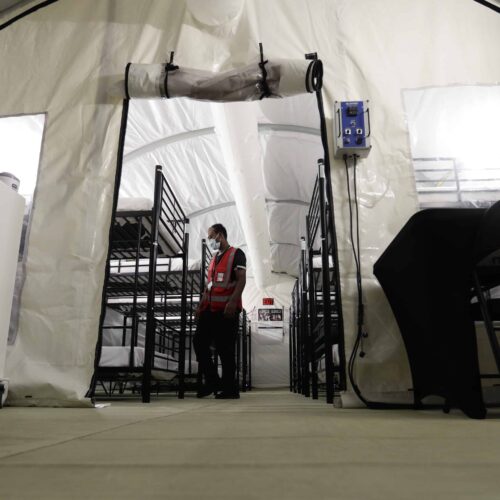Introduction
A lawsuit filed Monday in California includes extensive allegations of preventable deaths, medical neglect and other abusive treatment of immigrant detainees inside an expanding national network of public and privately-run jails.
The 200-page class-action lawsuit includes disturbing descriptions of life for people held in civil — not criminal — custody at some of the 158 facilities that provide long-term immigration lockup for the United States government. County jails, federal lockups and privately run detention centers are part of the system. Defendants named in the lawsuit include U.S. Immigration and Customs Enforcement, ICE, which supervises immigration detention, and multiple Trump administration officials.
The lawsuit’s goal is to obtain federal court intervention and monitoring throughout the ICE detention network, which has about 55,000 beds at its disposal. The U.S. Department of Homeland Security, DHS, is the parent agency of ICE.
The lawsuit further argues that DHS agencies and its contractors have a history of ignoring internal and outside watchdogs’ advice when it comes to preventing systemic detention abuses.
“There is no independent oversight, inasmuch as all entities that conduct inspections are paid and vetted [by DHS] — either as contractors or as direct employees,” the complaint alleges.
The lawsuit was filed in federal court in the Central District of California. Lawyers for the plaintiffs include the Civil Rights Education and Enforcement Center in Denver, Disability Rights Advocates in Berkeley, California, and the Georgia and Louisiana branches of the Southern Poverty Law Center.
In a statement, ICE said the agency “does not comment on pending litigation. That said, absence of comment should in no way be construed to suggest that ICE thinks any particular suit has merit.” NPR and the Center for Public Integrity recently reported on one of the internal DHS watchdogs the lawsuit alleges are weak: DHS’ Office for Civil Rights and Civil Liberties, or CRCL.
CRCL invites detainees or members of the public to submit complaints about detainee treatment, but the 100-person office is generally non-responsive when it comes to helping people who file those complaints, as the NPR and Public Integrity investigation revealed. For example, two migrant children — a blind 6-year-old and a deaf 17-year-old — were advised by CRCL to retain lawyers but offered no other help.
CRCL officials say their primary role is to offer civil-rights advice to ICE and issue reports to Congress. The lawsuit filed Monday, for example, says that CRCL sent 49 recommendations for reforms to a facility in Arizona where three immigrant detainees died between October 2012 and April 2013. “However, ICE took two years to respond, and even then, CRCL concluded that ICE did not respond appropriately to 30 of the 49 recommendations,” according to the complaint.
“CRCL has no enforcement power,” the lawsuit asserts, “so ICE is free to disagree with CRCL recommendations or refuse to implement them.”
“CRCL has no enforcement power, so ICE is free to disagree with CRCL recommendations or refuse to implement them.”
Lawsuit against ice and trump administration officials
Because of neglect at facilities, “dozens have unnecessarily died as a result of insufficient care,” the lawsuit alleges.
“It is often days, weeks, or months before [detainees] can see medical staff within detention facilities. They are commonly given over-the-counter pain medication as the only intervention, even if the underlying medical issue —from cancer to chest pain to depression — requires more serious and immediate treatment,” the complaint says. Examples of harm to detainees include cancer “undiagnosed for years, severe pain that is left untreated, and detained individuals who are placed at risk of amputation and other severe medical consequences.”
An ICE official who declined to be named argued in an email that “all ICE detainees, regardless of location, can expect timely and appropriate responses” to medical requests.
Detainees include asylum-seekers who arrived at the border, along with many people who are longtime residents of the United States with U.S. citizen children and in some cases U.S. citizen spouses. Some are U.S. military veterans. Detainees in ICE custody often have active court cases fighting deportation and could be released with supervision pending adjudication of their cases, attorneys argue.
The lawsuit cites multiple cases of death or hardship suffered in immigration confinement. Among them:
- On April 13, 2017, Sergio Lopez died from an upper gastrointestinal bleed while detained at the Adelanto ICE Processing Center in California, run by the private GEO Group Inc. An ICE detainee death review found that Lopez “never received a response to his sick call requests within 48 hours unless he was already scheduled for a follow-up appointment,” and that he had to wait “more than four weeks to see a provider after laboratory tests showed abnormal results in February 2017.”
- On Nov. 27, 2016, Raquel Calderon de Hidalgo “became the fifteenth person to die while in custody” at Arizona’s Eloy Detention Center, run by the private company CoreCivic. Calderon de Hidalgo died of a pulmonary embolism due to deep vein thrombosis. She had suffered a leg injury, and did not receive prompt treatment, the suit alleges, due to schedule delays and mistakes and died of a blood clot that developed from her leg injury.
- Jose Baca Hernandez is blind, and has been in two ICE facilities without “effective communication” and “has to rely on his cell mates, attorneys, and, at times, guards to read any documents, including those related to his medical care and immigration case.”
- An unnamed woman detained at California’s Otay Mesa Detention Center, also operated by CoreCivic, experienced pain in her abdominal area. After five months, she was taken to a hospital in shackles for an ultrasound test, diagnosed with uterine fibroids and told that she needed to see a gynecologist. When she returned to detention, the lawsuit alleges, she was given ibuprofen and told to wait for an appointment. Two months later, in March 2019, according to the complaint, the woman was still waiting despite complaining repeatedly to detention staff that she was suffering vaginal bleeding.
When investigations and suggested reforms are ignored, “that plays out on people’s bodies,” said Elizabeth Jordan, an attorney with the Civil Rights Education and Enforcement Center in Denver.
In an interview, Jordan discussed the suicides of two detainees in 2017 and 2018, both of whom were suffering mental illness and had been put into solitary confinement at the Stewart Detention Center in Lumpkin, Georgia. The lawsuit Jordan helped file Monday says the DHS’s Inspector General Office found in April 2017 that the CoreCivic-run facility had staffing problems, and that one employee described medical care as a “ticking time bomb.”
In both suicide cases, the lawsuit argues, CoreCivic guards failed to perform a required check of the detained individual’s cells.
“Immigration detention is 100 percent prison,” Jordan said, although it’s not supposed to be punitive.
Further, she said, it’s “prison without a lawyer” since immigrants are not entitled to the appointment of lawyers and must rely on pro bono counsel or, if they can afford it, paid representation.
“Conditions in detention are so brutal,” the lawsuit argues, “that many people are forced to abandon viable claims for immigration relief and accept deportation out of a desperate desire to escape the torture they are enduring in detention on U.S. soil.”
Read more in Inequality, Opportunity and Poverty
Immigration
Fallan en traer de vuelta a los muertos
Los sistemas internacionales para identificar, repatriar a los migrantes que desaparecen o mueren en su viaje continúan fallando.
Immigration
Failing to bring back the dead
International systems to identify and return the remains of migrants who die on their journeys continue to falter.



Join the conversation
Show Comments